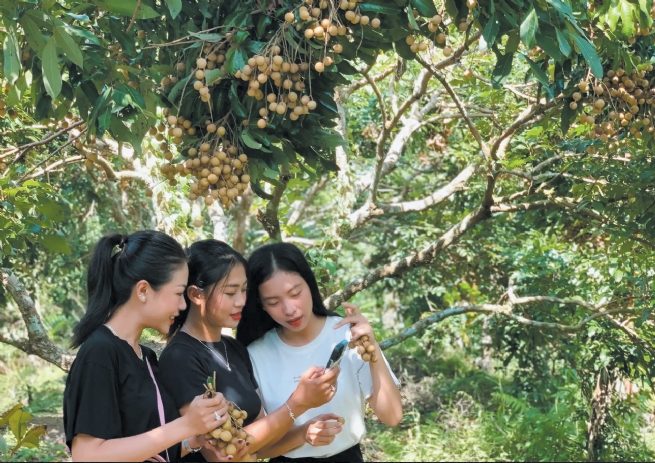Located in the center of the Mekong Delta, Can Tho has a mild climate, abundant freshwater resources and favorable conditions for agricultural development. By speeding up production restructuring, the city's agricultural sector is carrying out many solutions to link production with consumption, strongly converting from breadth to depth, applying high technology to improve quality and yield towards green and sustainable growth.

Can Tho has many advantages to develop agritourism. In the photo: tourists visit a longan garden in Phong Dien district
In-depth growth
In nearly 2 decades since becoming a centrally run city (2004 - 2024), especially when Resolution 59-NQ/TW dated August 5, 2020 of the Politburo on Can Tho City construction and development to 2030, with a vision to 2045, was issued, the city's agriculture sector has made remarkable changes and achieved much progress. The sector increasingly affirms its centrality in the region and makes an important contribution to socioeconomic development and livelihood.
Agricultural production has shifted strongly from breadth to depth. Given speedy urbanization, the area of agricultural land is shrinking but agricultural yield is constantly improving, production restructuring is on the right track towards higher added value and sustainable development. The city's agricultural land area was 115,705.03 ha in 2004 and 114,168.42 ha in 2022, a shrinkage of over 1,500 ha. The labor structure in the agricultural and fisheries sectors was 26.77% in 2022, down nearly 10% from 2004 (36.57%). The production value per hectare of agricultural and aquatic land in 2022 rose by 5.13 times from 2004, from VND31.79 million to VND163.19 million. The share of high-quality rice varieties gradually increased from 54.8% (2004) to over 95% (2023), helping boost rice quality and value and ensure profitability of over 30% for farmers.
Besides, the sector’s growth is positive and steady. The city develops intensive agriculture towards commercialized value chains, applies high technology and couples processing with consumption. The city has witnessed many effective production models such as specialized high-yield pangasius farming, agritourism model, specialized export orchards and urban agriculture.
With agricultural restructuring, many production stages such as land preparation, irrigation and harvesting have been completely mechanized. The city formed concentrated specialized areas for aquaculture, rice, vegetable, ornamental flower and fruit production to harvest high-quality products for domestic consumption and export and align with agritourism development. A typical example is the large-field movement. Debuted in the summer-autumn crop in 2011 with an initial area of only 400 ha in Vinh Thanh district, the model has to date expanded to 94 fields with over 33,000 ha a crop.
After 20 years, the agricultural sector has affirmed its support role for the economy in difficult times. From locally available agricultural products, Can Tho City has developed many OCOP products (One Commune One Product) to enhance the value of agricultural products, facilitate tourism development and raise people's livelihoods. Currently, the city has nearly 500 agricultural and aquatic product processors and 92 OCOP-accredited products, ranked 3-4 stars or higher. More farmers are participating in agritourism.
The face of rural areas is uplifted. Social and economic infrastructure in rural areas is developed to ensure good production and service. Adaptability to climate change is strengthened. The environment landscape is made brighter, greener, cleaner and nicer. Can Tho is the only provincial unit in the Mekong Delta to complete new rural construction, with all communes and districts certified to meet new rural development standards in the 2015 - 2020 period. At present, Can Tho has 26 out of 36 communes recognized to fulfill advanced new rural development standards and two communes to achieve model new rural development standards.
Towards high-tech, sustainable agriculture
Mr. Nguyen Van Su, Director of the Department of Agriculture and Rural Development, said: Can Tho City is aiming to build a strong, large-scale, sustainable smart commercial agriculture, achieve high productivity, quality, yield, value and high competitiveness, and provide high-tech agricultural services to Mekong Delta provinces.
By 2030, the GRDP growth of the agricultural sector is expected at 2.5-3% a year and the agricultural productivity growth at 5.5-6% a year. Over 70% of agricultural workers will be trained. The income of rural people will rise by three times from 2020. The city will strive to have all 36 communes certified to meet advanced new rural development standards and 18 communes recognized to fulfill model new rural development standards.
In the coming time, the sector will unlock its advantages and resources and focus on building specialized pangasius, fruit and rice farming areas to ensure standards for targeted market segments.
The agricultural sector will develop agricultural value chains together with preservation, processing, trade of agricultural products and agricultural tourism; and develop high-tech and digitalized agriculture, facilitate circular agriculture and mechanize agriculture.
The city will boost investment in high-tech agricultural zones in Vinh Thanh, Co Do and Thoi Lai districts; deploy solutions to effectively use land funds and build Song Hau Farm and Co Do Agriculture Co., Ltd into high-tech agricultural areas; attract strategic investors to agricultural processing and trading; and strengthen links in the value chain.
In addition, the city will develop urban agriculture to form the ecological environment and landscape, provide green food and tourism services, and promote sustainable urban development.
“Can Tho City is working with the Ministry of Agriculture and Rural Development to submit to the Prime Minister a project on establishment of a Mekong Delta center for linking, producing, processing and trading agricultural products in Can Tho. The center will help the Mekong Delta integrate with export markets. The agricultural sector will also continue to support small and medium-sized agricultural product processors to standardize quality and gradually ensure export standards, thus affirming and promoting the role and position of the regional center in production and processing,” he affirmed.
Ngoc Tung (Vietnam Business Forum)